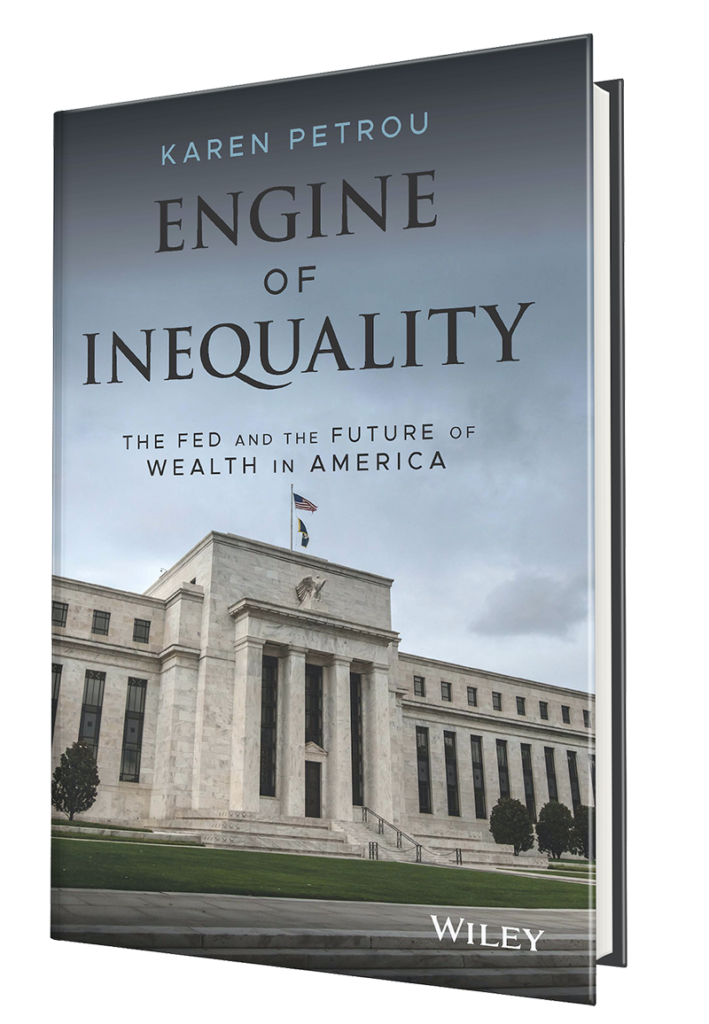Our Services
Engine of Inequality, by Karen Petrou
The first book to reveal how the Federal Reserve holds the key to making us more economically equal, written by an author with unparalleled expertise in the real world of financial policy.
Following the 2008 financial crisis, the Federal Reserve’s monetary policy placed much greater focus on stabilizing the market than on helping struggling Americans. As a result, the richest Americans got a lot richer while the middle class shrank and economic and wealth inequality skyrocketed. In Engine of Inequality, Karen Petrou offers pragmatic solutions for creating more inclusive monetary policy and equality-enhancing financial regulation as quickly and painlessly as possible.
“Petrou’s book uncovers a hidden engine of our skyrocketing inequality: financial-policy. In an accessible and engaging prose, Petrou takes us through the inner workings of monetary policy at the Fed and financial regulations, how they’ve made inequality worse and how they could instead be retooled to take us to a more equitable future. A novel look at the problem of inequality and bold ideas to help resolve it. A must read.”—Emmanuel Saez, Professor of Economics at the University of California Berkeley and author of The Triumph of Injustice
Read full description and reviews.

Industry Expert
Federal Financial Analytics (FedFin) is a Washington-based financial services-consulting firm that has for decades attracted a high-powered clientele in Washington, on Wall Street, and among global central bankers. Since 1985 FedFin has provided a unique blend of analysis and strategic advice on public policy, regulatory, and legislative issues for industry and governmental clients doing business in the U.S. and abroad.
A proprietary think-tank for its clients, FedFin reviews critical federal and global policy developments in banking, insurance, asset management, and mortgage finance, analyzes them in great depth, and then advises clients on whether what they want can be made to work for them, within the policy environment and for the financial system. It is FedFin’s guiding principle to be an honest broker, and clients depend on the fact that the firm does not offer lobbying or any other services that could compromise its objectivity and independence.
As seen In:
In the News
Marketplace, Wednesday, January 15, 2025
Big banks are raking in cash By Caleigh Wells The end of 2024 was a great time for big banks. Goldman Sachs, Citigroup, BlackRock — a bunch of financial institutions posted their calendar fourth-quarter earnings Wednesday. And a lot of them exceeded investors’ already rosy expectations. JPMorgan Chase and Wells [...]
American Banker, Tuesday, January 7, 2025
Barr's self-demotion changes little for regulatory outlook By Kyle Campbell Michael Barr has elected to end his term as Federal Reserve's top regulator a year and a half ahead of schedule, taking the threat of a costly and potentially damaging legal fight with the incoming Trump administration off the table [...]
American Banker, Monday, December 16, 2024
Where the Fed's Michael Barr goes from here By Kyle Campbell Michael Barr has a lot to do and little time to do it. His term as vice chair for supervision at the Federal Reserve ends in 19 months. Before then, he hopes to change liquidity standards, require more banks [...]
Issues in Focus
The Vault
FedFin on: Debanking Prohibition
In concert with other efforts to prevent debanking, two Republican senators have introduced legislation to bar insured depository institutions from certain government contracts if the IDI or its affiliate refuses to do business with lawful enterprises they dislike on what the bill describes as social-policy grounds. The bill is very brief and thus does not provide an administrative framework for implementation in areas such as determining which entities banks inappropriately [...]
FedFin Assessment: What Happens When OMB Runs Bank Regulation
In this report, we build on our earlier alert regarding the President’s executive order (EO) bringing federal financial regulation and supervision directly under the Executive Branch. Although some commenters have suggested this will have little material impact given pending Trump nominees to key posts, we expect it will at the least slow and in many cases alter what would be largely technical decisions by moving them into the often-viral political [...]
Karen Petrou: The Fed’s Sudden GSIB Jihad
Even as he stoutly assured Congress last week that the Fed is staunchly apolitical, Chair Powell acknowledged several post-inauguration epiphanies. These include sudden recognition of the supplementary leverage ratio’s impact on Treasury-market liquidity and the importance of cost-benefit and cumulative regulatory-impact analyses along with disavowal of all things climate risk. Another Fed U-turn relates to merger policy, but this escaped broad notice. It shouldn’t have – bank-merger policy is due [...]



